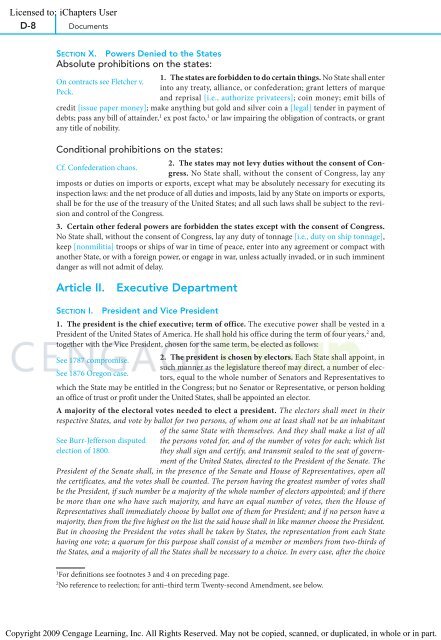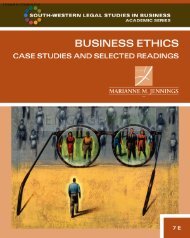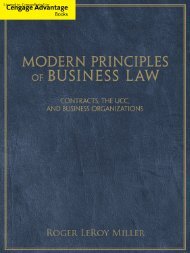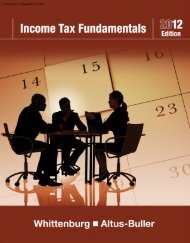03469_00_FM_pi-xxxii pp2.indd - CengageBrain
03469_00_FM_pi-xxxii pp2.indd - CengageBrain
03469_00_FM_pi-xxxii pp2.indd - CengageBrain
Create successful ePaper yourself
Turn your PDF publications into a flip-book with our unique Google optimized e-Paper software.
Licensed to:<br />
D-8 Documents<br />
SECTION X. Powers Denied to the States<br />
Absolute prohibitions on the states:<br />
On contracts see Fletcher v.<br />
Peck.<br />
1. The states are forbidden to do certain things. No State shall enter<br />
into any treaty, alliance, or confederation; grant letters of marque<br />
and reprisal [i.e., authorize privateers]; coin money; emit bills of<br />
credit [issue paper money]; make anything but gold and silver coin a [legal] tender in payment of<br />
debts; pass any bill of attainder, 1 ex post facto, 1 or law impairing the obligation of contracts, or grant<br />
any title of nobility.<br />
Conditional prohibitions on the states:<br />
2. The states may not levy duties without the consent of Con-<br />
Cf. Confederation chaos.<br />
gress. No State shall, without the consent of Congress, lay any<br />
imposts or duties on imports or exports, except what may be absolutely necessary for executing its<br />
inspection laws: and the net produce of all duties and imposts, laid by any State on imports or exports,<br />
shall be for the use of the treasury of the United States; and all such laws shall be subject to the revision<br />
and control of the Congress.<br />
3. Certain other federal powers are forbidden the states except with the consent of Congress.<br />
No State shall, without the consent of Congress, lay any duty of tonnage [i.e., duty on ship tonnage],<br />
keep [nonmilitia] troops or ships of war in time of peace, enter into any agreement or compact with<br />
another State, or with a foreign power, or engage in war, unless actually invaded, or in such imminent<br />
danger as will not admit of delay.<br />
Article II. Executive Department<br />
SECTION I. President and Vice President<br />
1. The president is the chief executive; term of office. The executive power shall be vested in a<br />
President of the United States of America. He shall hold his office during the term of four years, 2 and,<br />
together with the Vice President, chosen for the same term, be elected as follows:<br />
See 1787 compromise. 2. The president is chosen by electors. Each State shall appoint, in<br />
such manner as the legislature thereof may direct, a number of elec-<br />
See 1876 Oregon case.<br />
tors, equal to the whole number of Senators and Representatives to<br />
which the State may be entitled in the Congress; but no Senator or Representative, or person holding<br />
an office of trust or profit under the United States, shall be appointed an elector.<br />
A majority of the electoral votes needed to elect a president. The electors shall meet in their<br />
respective States, and vote by ballot for two persons, of whom one at least shall not be an inhabitant<br />
See Burr-Jefferson disputed<br />
election of 18<strong>00</strong>.<br />
of the same State with themselves. And they shall make a list of all<br />
the persons voted for, and of the number of votes for each; which list<br />
they shall sign and certify, and transmit sealed to the seat of government<br />
of the United States, directed to the President of the Senate. The<br />
President of the Senate shall, in the presence of the Senate and House of Representatives, open all<br />
the certificates, and the votes shall be counted. The person having the greatest number of votes shall<br />
be the President, if such number be a majority of the whole number of electors appointed; and if there<br />
be more than one who have such majority, and have an equal number of votes, then the House of<br />
Representatives shall immediately choose by ballot one of them for President; and if no person have a<br />
majority, then from the five highest on the list the said house shall in like manner choose the President.<br />
But in choosing the President the votes shall be taken by States, the representation from each State<br />
having one vote; a quorum for this purpose shall consist of a member or members from two-thirds of<br />
the States, and a majority of all the States shall be necessary to a choice. In every case, after the choice<br />
1 For defi nitions see footnotes 3 and 4 on preceding page.<br />
2 No reference to reelection; for anti–third term Twenty-second Amendment, see below.<br />
Copyright 2<strong>00</strong>9 Cengage Learning, Inc. All Rights Reserved. May not be co<strong>pi</strong>ed, scanned, or duplicated, in whole or in part.










